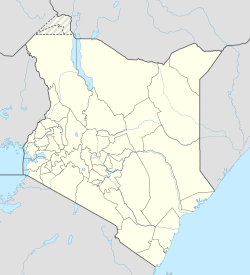Kayole
Kayole | |
|---|---|
| Coordinates: 01°16′04″S 36°54′09″E / 1.26778°S 36.90250°E | |
| Country | Kenya |
| County | Nairobi City |
| Sub-county | Embakasi and Njiru |
| Area | |
• Total | 3.4 km2 (1.3 sq mi) |
| Population (2019)[1] | |
• Total | 189,189 |
| • Density | 56,000/km2 (140,000/sq mi) |
Kayole is a low-income neighbourhood in the city of Nairobi. Located within the larger Eastlands area of Nairobi, it is approximately 11 kilometres (6.8 mi) east of the central business district.
Location
Kayole is located approximately 11 kilometres (6.8 mi) east of Nairobi's central business district, straddled by Kangundo Road to the south, within the Eastlands area in Embakasi. It borders other low-income neighbourhoods such as Donholm, Njiru, Saika and Umoja. Electorally, Kayole is placed under Embakasi Central Constituency; the whole constituency is within the Embakasi and Njiru sub-counties.
Overview
Kayole is generally a low-income, high-density, mixed-use neighbourhood located in Nairobi's Eastlands area.[2] It encompasses other smaller neighbourhoods such as Sabasaba and Kayole-Soweto. Due to its affordability, Kayole hosts low-income earners, holding a significant percentage of the city's population. The neighbourhood exhibits characteristics of a slum; has a mix of storey buildings as well as slum-like structures especially in Kayole-Soweto slum to the south.[3] A significant number of residents in Kayole are unemployed, live in abject poverty, and can barely raise $1 a day.[4]
In terms of security, Kayole is riddled with criminal gangs, kidnappings, armed and aggravated robberies, theft, as well as child trafficking.[5] With a significant number of crimes committed by female perpetrators.[6][7] The criminal gangs are distinct from other gangs in neighbourhoods such as: Mathare, Huruma, Dandora and Eastleigh.[8] Reports of extra-judicial killings by law enforcement in Kayole are also high.[9]
As of 2019, Kayole has a population of 189,189, with 70,461 of them being residents of Kayole North, 118,728 in Kayole Central and Kayole South.[1]
References
- ^ a b "2019 Kenya Population and Housing Census Volume II: Distribution of Population by Administrative Units". Kenya National Bureau of Statistics. p. 247. Retrieved 28 March 2020.
- ^ "Kayole, a clutter of tall storey buildings". The Standard. Retrieved 15 November 2022.
- ^ "Kenya: Assessment of Kayole-Soweto Informal Settlement | The Global Partnership for Results-Based Approaches (GPRBA)". www.gprba.org. Retrieved 15 November 2022.
- ^ "Transforming Kayole". PAWA254. 8 December 2020. Retrieved 15 November 2022.
- ^ "Why Kayole is The Crime Capital of Nairobi -". 20 June 2021. Retrieved 15 November 2022.
- ^ Nguni, Mercy Wambui (2019). The Effect of Women Involvement in Violent Crime: A Case Study of Kayole, Nairobi County (Thesis thesis). United States International University - Africa.
- ^ MURAYA, JOSEPH (21 August 2019). "In Kayole, youthful criminals are ready to kill just to impress their girlfriends » Capital News". Capital News. Retrieved 15 November 2022.
- ^ "Scars of the gangs: Inside the Criminal Underworld of Nairobi's Eastlands". Nairobi News. 15 September 2020. Retrieved 15 November 2022.
- ^ "How Facebook is being used to profile and kill Kenyan 'gangsters'". BBC News. 16 April 2019. Retrieved 15 November 2022.


